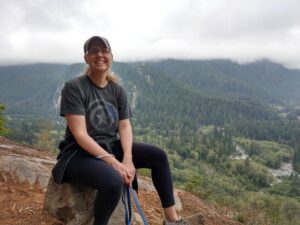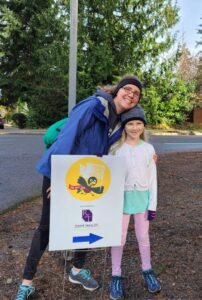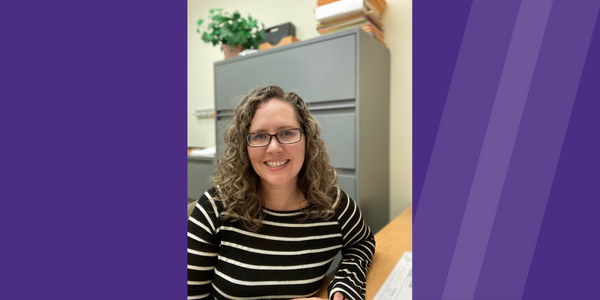UW BioE grants and contracts manager
Chelsea Musick has a passion for efficiency. If there is a faster or easier way to perform a task, she will find it. This has served her and the UW well in her role as grants and contracts manager for the Department of Bioengineering.
Chelsea has worked for UW BioE since 2005 and has held several jobs, from office assistant to program manager, before moving into her current role in 2018. She was recently appointed co-chair for the Research Administrators Peer Network (RAPN) and is involved in the University of Washington Finance Transformation (UWFT). UWFT is a process the UW is undertaking to update from decentralized financial systems to one financial systems program. Additionally, she is a certified Lean Six Sigma Yellow Belt, a certification that shows she understands the essential Six Sigma concepts of improvement focused on eliminating unnecessary time and effort in processes and procedures while promoting the standardization of work and flow.
UW BioE spoke to Chelsea about her job, work philosophies and her many contributions to a more efficient UW. This conversation has been edited for length and clarity.
What do you do in your role as grants and contracts manager?

UW Bioengineering grants and contracts manager Chelsea Musick enjoying a hike
I manage the post grant award budgets and reporting for more than 20 faculty, and also act as subject matter expert for grants for the department. I handle all the administrative tasks that happen once faculty have their money. For example, when a faculty member receives a notice of award, they forward it to me, and I then reach out to the Office of Sponsored Programs (OSP). (This central UW department submits proposals, manages awards and performs the grants closeout processes.) I assist with the process to assign the project a budget number so the faculty can start spending it. I make sure the correct people are involved, such as subcontractors, and work with OSP or other departments to finalize the set up. I provide award projections and track reports that are due. Sometimes the award sponsors will reach out with questions or will request additional information. I help to bridge that. There are a lot of behind-the-scenes details that happen within the UW, and I do my best to handle those pieces so the faculty can focus on their research.
What do you enjoy about your job and working at UW?
I love the fact that we are here to make a difference in the world. We’re here to help people, especially in BioE. When COVID hit, we had faculty that were immediately submitting proposals to help with the pandemic. I am happy to be able to make it easier for them to do their research by taking the administrative burden off them. In a small way, I’m helping to make a difference in the world.
I have been with BioE so long because of the people in the department. Everyone I’ve worked with has been amazing, kind, and just a joy to work with. I’ve been lucky to have such wonderful coworkers.
How has your passion for efficiency benefited you and UW?
I love to look at a problem and not only solve it but see how I can make it easier to solve the next time. There are a lot of ways to make the work we do easier and better. Any time I can volunteer to make things more efficient, I do! For example, I enjoy volunteering for user feedback studies with ORIS (Office of Research Information Systems). They provide the internal software and systems that grants admins use, and I definitely have opinions about how those systems could be more user friendly and efficient.
You were recently appointed co-chair for the Research Administrators Peer Network (RAPN). What is it and what do you do as co-chair?
RAPN is part of the School of Medicine and is an organization for people who work in research administration. We meet once a month, September through May. We invite internal speakers that might be of interest to people who work in research administration. The speakers answer questions and talk about what they do and things that directly affect research administration. It’s been helpful to me to get insight into what happens in other departments and what happens centrally.
I also co-manage the new RAPN Teams channel, which has been a fantastic resource for those of us in research admin. It has helped to connect people and provide an easy way to ask questions and share information.
How are you involved with University of Washington Finance Transformation (UWFT)?
I am a change agent for BioE, which is a role within the UWFT framework. I attend a lot of Zoom meetings and get information on specific changes that are happening and how they’ll affect the department and specific users. I then disseminate the information to people who will be affected. So rather than overloading everybody with unnecessary information, the information is sent to the change agents who forward it to the appropriate people. I’m volunteering as a power user so that I can help test things out. (Power users are high-performing employees who are subject matter experts in their departments and who help with process and/or system questions and issues resolution.)
What are some of the biggest changes you’ve seen at UW and in BioE over the 17 years you’ve worked here?
Things have changed a lot! When I first started with grants, I remember having to walk the grant proposals to each person who had to sign off on them. You would drop the whole proposal in a bin and [the recipient] would email you when it was ready to be picked up and taken to the next person. They are now routed online. In 2005 when I worked at UWEB (University of Washington Engineered Biomaterials), we still had to submit paper grant applications. I remember one time where we had to drive a grant proposal down to the FedEx plane at Boeing Field so that we had more time to get it completed – 7 p.m. versus 5 p.m. at the Post Office. There was a lot of paper! I love that everything is now online. That’s one reason it has been so easy to work from home, since I don’t have to physically touch any paper.
What do you like to do when you’re not working?

Chelsea Musick and her daughter, Adara, participated in the 5k Turkey Trot to benefit the Issaquah Food & Clothing Bank
I volunteer a lot. I am the co-president of the PTSA for the elementary school my youngest daughter attends. I’m the co-communications director for PTSA for the high school my oldest son attends. I’m also a Girl Scout troop leader and I’m on the board of a community organization called the Issaquah Highlands Community Fund. I definitely keep busy! In my downtime I love to hike and read and try to catch up on my sleep.
Article by Arden Clise


